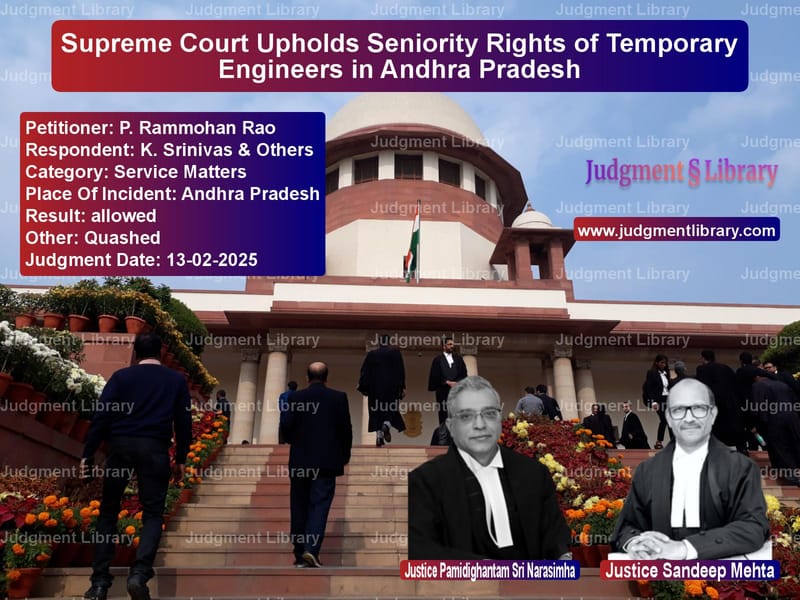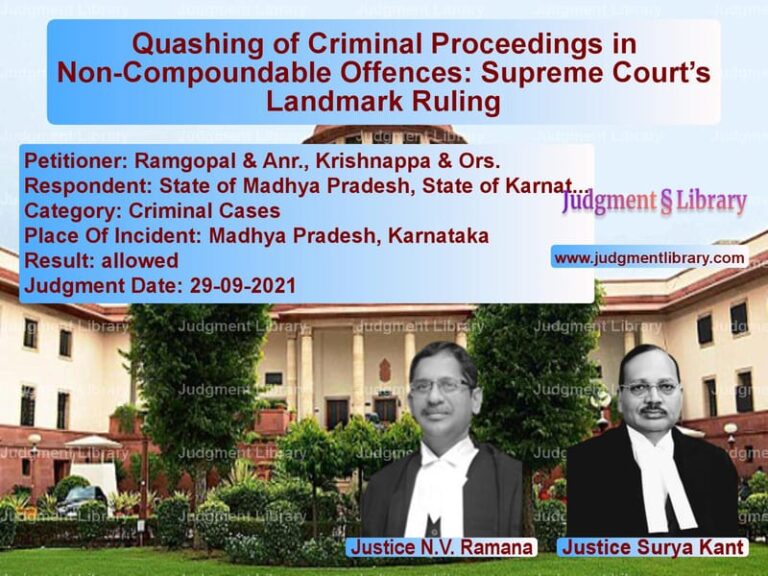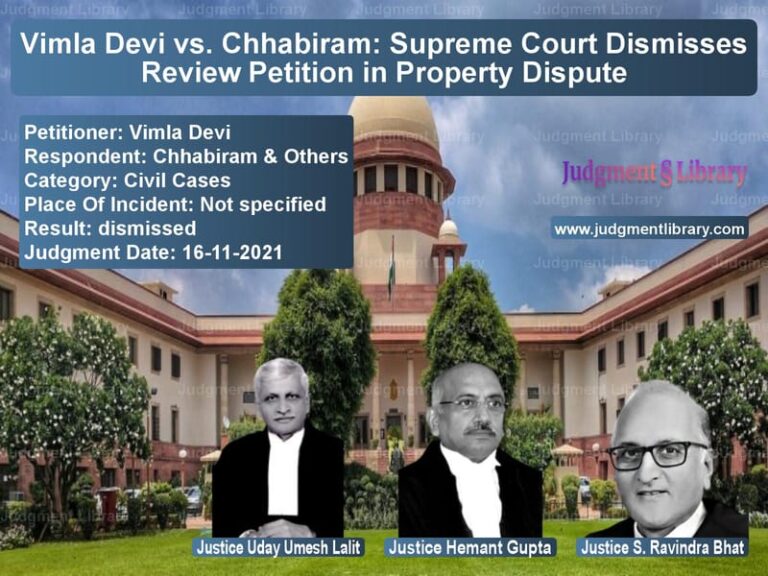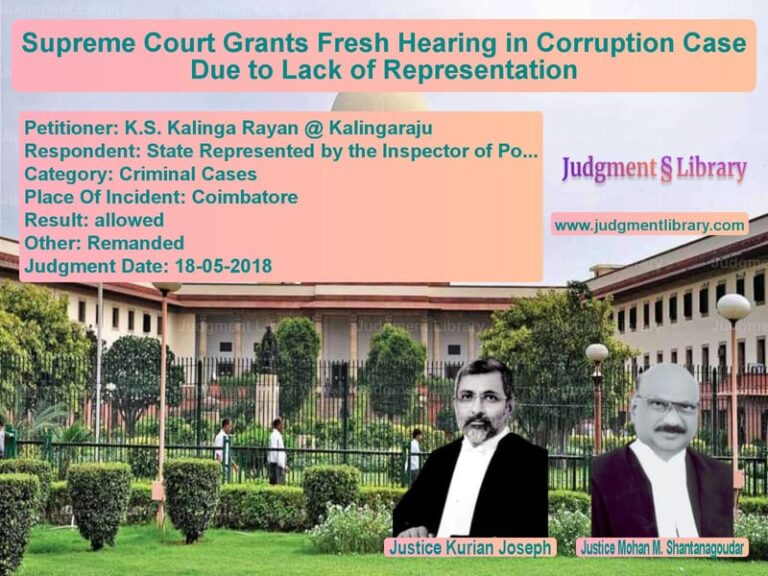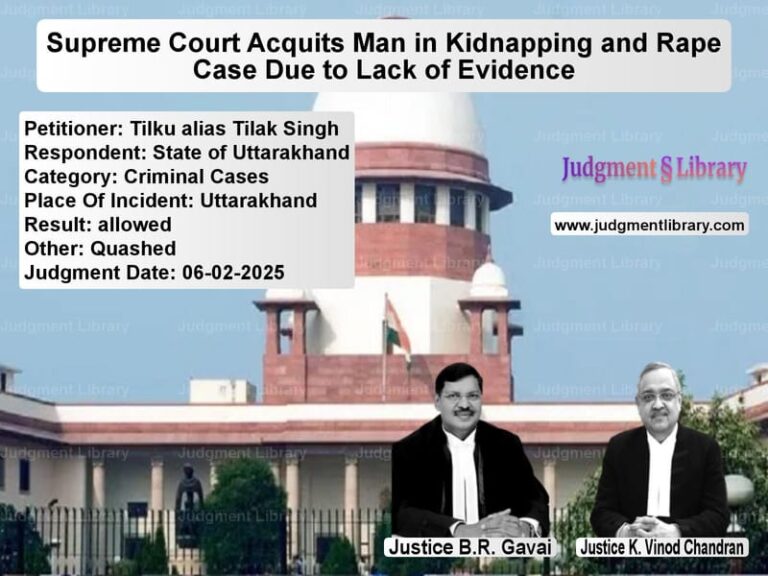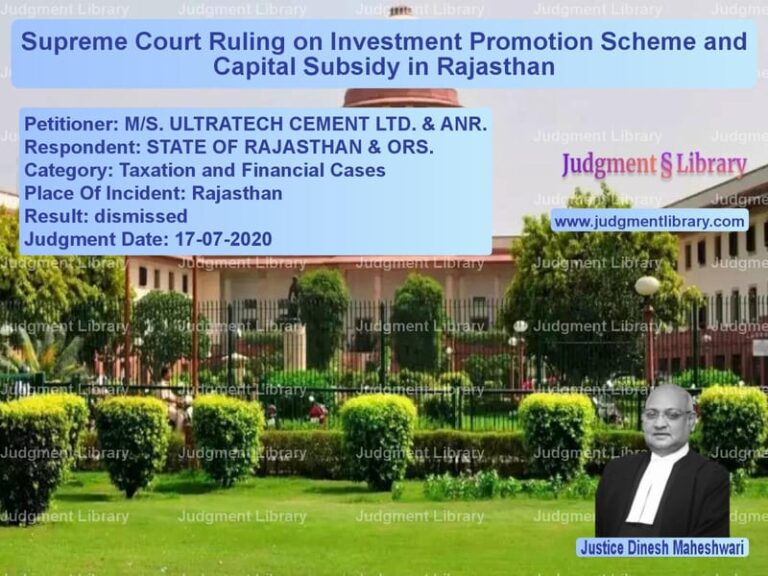Supreme Court Upholds Seniority Rights of Temporary Engineers in Andhra Pradesh
The Supreme Court of India recently ruled in the case of P. Rammohan Rao vs. K. Srinivas & Others, settling a long-standing dispute over the seniority and regularization of Assistant Executive Engineers (AEEs) in the Panchayat Raj Department of Andhra Pradesh. The case revolved around the government’s decision to grant seniority benefits to engineers appointed between 1990-1992 over those appointed in 1997 through the Andhra Pradesh Public Service Commission (APPSC).
Background of the Case
The dispute originated in the 1990s when the Andhra Pradesh government faced an urgent requirement for engineers under the Cyclone Emergency Reconstruction Project (CERP). To address this need, the government appointed engineers as AEEs on a temporary basis between 1990 and 1992. Over time, these temporary appointees sought regularization of their services, leading to a series of government orders (G.O.Ms) and legal battles over seniority.
The major developments in the case were:
- 1990-1992: Engineers were appointed as AEEs under temporary provisions.
- 1995: The Andhra Pradesh government issued Notification No. 8, calling for fresh recruitment of AEEs through the APPSC.
- 1997: Candidates selected via the APPSC examination were appointed as AEEs.
- 2005: The government issued G.O.M. No. 234, regularizing the services of the temporary AEEs but placing them below the 1997 batch in seniority.
- 2006: The government revised its decision through G.O.M. No. 262, granting seniority to the 1990-1992 batch over the 1997 batch.
- 2023: The Telangana High Court struck down G.O.M. No. 262, ruling in favor of the 1997 batch.
- 2025: The Supreme Court overturned the High Court ruling, upholding the 2006 government order and restoring seniority to the 1990-1992 batch.
Arguments by the Petitioners (1990-1992 Batch AEEs)
The petitioners contended:
- They had been serving continuously as AEEs since their temporary appointment in the early 1990s.
- The delay in their regularization was due to government inaction and not their fault.
- Unlike the 1993-1995 appointees, their appointments were not subject to APPSC selection criteria.
- The Supreme Court’s decision in Direct Recruit Class II Engg. Officers’ Association v. State of Maharashtra (1990) supported their claim for counting seniority from their initial appointment.
- The principle of functus officio does not apply to government rule-making, and the government had the right to modify its earlier decision.
Arguments by the Respondents (1997 Batch AEEs)
The 1997 batch AEEs, selected through the APPSC process, argued:
- They had undergone a rigorous competitive selection process and deserved higher seniority.
- The 1990-1992 appointees were hired without an open competitive process and should not be granted retrospective seniority.
- The government had already finalized their regularization through G.O.M. No. 234 in 2005, and revising it through G.O.M. No. 262 in 2006 was legally untenable.
- The Telangana High Court was correct in striking down the 2006 order as it was issued without due consultation with affected employees.
Supreme Court’s Observations
The Supreme Court analyzed the evidence and the legal framework governing the case. The key observations included:
- The initial appointment of the 1990-1992 batch was not ad hoc. The Court noted that the appointments were made under Rule 10(a)(i)(1) of the Andhra Pradesh Subordinate Service Rules, which allowed appointments when no formal selection mechanism was available.
- The delay in regularization was not due to employee fault. The government failed to amend service rules in time, leading to delayed confirmation of their appointments.
- Seniority must be counted from the date of initial appointment if the appointees serve continuously until regularization.
- The principle of functus officio does not apply to administrative rule-making, and the government had the power to modify G.O.M. No. 234.
- The government’s decision to assign higher seniority to the 1990-1992 batch in G.O.M. No. 262 was legally justified and based on equitable considerations.
Final Judgment
The Supreme Court ruled:
- Overturned the High Court’s order.
- Upheld G.O.M. No. 262, granting seniority to the 1990-1992 batch.
- Reinstated the original seniority list placing the 1990-1992 batch above the 1997 batch.
- Held that the government was well within its powers to modify previous orders for fairness and efficiency.
Conclusion
The Supreme Court’s judgment sets a precedent for similar service matters, reinforcing that:
- Long-serving temporary employees cannot be disadvantaged due to administrative delays in regularization.
- Government decisions on seniority can be revised if they are made to correct historical injustices.
- Temporary appointments not made against backdoor recruitment but due to government exigencies should be treated fairly.
- The principle of functus officio does not prevent governments from modifying prior administrative decisions.
With this ruling, the Supreme Court has ensured that employees who have dedicated years to public service are not unfairly placed below those who joined later through formal selection processes.
Petitioner Name: P. Rammohan Rao.Respondent Name: K. Srinivas & Others.Judgment By: Justice Pamidighantam Sri Narasimha, Justice Sandeep Mehta.Place Of Incident: Andhra Pradesh.Judgment Date: 13-02-2025.
Don’t miss out on the full details! Download the complete judgment in PDF format below and gain valuable insights instantly!
Download Judgment: p.-rammohan-rao-vs-k.-srinivas-&-others-supreme-court-of-india-judgment-dated-13-02-2025.pdf
Directly Download Judgment: Directly download this Judgment
See all petitions in Employment Disputes
See all petitions in Promotion Cases
See all petitions in Recruitment Policies
See all petitions in Public Sector Employees
See all petitions in Judgment by P.S. Narasimha
See all petitions in Judgment by Sandeep Mehta
See all petitions in allowed
See all petitions in Quashed
See all petitions in supreme court of India judgments February 2025
See all petitions in 2025 judgments
See all posts in Service Matters Category
See all allowed petitions in Service Matters Category
See all Dismissed petitions in Service Matters Category
See all partially allowed petitions in Service Matters Category

